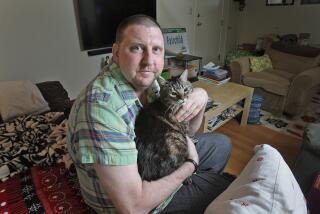For terminal patients, early talk about end of life can alter choice
- Share via
Terminal cancer patients who receive information early about end-of-life care receive less medical care during their last days and are more likely to enter hospice, according to a study in the Journal of Clinical Oncology. The findings suggest that early discussion about the likely outcome of a terminal illness can dramatically change a patient’s end-of-life decision-making.
According to the study, which was carried out by a team led by Dr. Jennifer Mack of the Dana-Farber Cancer Institute in Boston, national guidelines suggest that doctors begin discussions about end-of-life care shortly after diagnosing a terminal illness. But, the researchers write, it has been unclear whether such conversations actually affect end-of-life care.
To find out, Mack and her team studied 1,231 patients who had stage IV lung or colorectal cancer and survived at least a month after the study began but died during the 15-month period of the study. The researchers recorded when patients had end-of-life discussions with their doctors and kept track of the care they received.
Overall, just under half of patients in the study received aggressive care during their final 30 days, with 14% receiving chemotherapy in their last 14 days, 9% ending up in the ICU and a full 40% receiving intensive treatments.
But those who had early discussions with their doctors about end-of-life care were significantly less likely to receive such treatments and were significantly more likely to enter hospice before death. The findings suggest that early discussions between doctor and patient about options for treatment do have a significant effect on a patient’s choices down the road.
The authors point out that end-of-life decision-making “requires time; most patients need to process the idea that life is nearing its end before they can make decisions about their EOL care.”
The authors admit that they do not know whether the two paths — early conversations followed by a high likelihood of hospice or reduced treatment, versus late conversations and an increased probability of aggressive care — simply represent the preferences of the patients involved. Perhaps such patients want life to continue at any cost, a subtlety the study’s design would render invisible.
Nevertheless, they conclude, “Most patients who recognize that they are dying do not want such care. Evidence suggests that less aggressive care is also less costly and less burdensome for surviving family members. Given the many arguments for less aggressive EOL care, earlier discussions have the potential to change the way EOL care is delivered for patients with advanced cancer and help to assure that care is consistent with patients’ preferences.”
Return to the Booster Shots blog.






